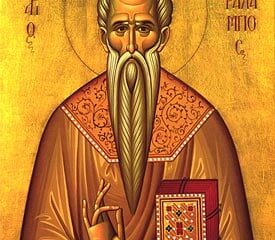In the USA, it’s Veterans Day, when those, both living and dead, who have served in the Armed Forces are honoured, but in my country, Canada, this day is our Remembrance Day, when we commemorate those who gave their lives in war to protect and preserve the innocent and the ideals we hold close.
In Flanders fields the poppies blow
Between the crosses, row on row,
That mark our place; and in the sky
The larks, still bravely singing, fly
Scarce heard amid the guns below.
We are the Dead. Short days ago
We lived, felt dawn, saw sunset glow,
Loved and were loved, and now we lie,
In Flanders fields.
Take up our quarrel with the foe:
To you from failing hands we throw
The torch; be yours to hold it high.
If ye break faith with us who die
We shall not sleep, though poppies grow
In Flanders fields.
John McCrae.
War is pretty much universally acknowledged as something to be avoided, although Western Christians argue that war can be a moral good, that it can be a “just” (in the sense of justice) war. A just war, according to the Catholic Church catechism, is one which fulfills three conditions. If the use of force will obtain justice, then using force is morally good. Second, the intentions of those about to wage war must be good in themselves: they must seek to obtain justice or restrain evil. Third, it must be appropriate in the circumstances – that is, even though the use of force may be contemplated to obtain justice and to restrain evil, there may be other, less destructive means available to obtain those ends. If there is no other way, then the war to be waged, according to western thought, is just, and justifiable.
The Orthodox church fathers reject the concept of a moral war and of a just war. For the fathers of the church, war is evil, no matter how evil the opposing force, no matter how badly justice is being betrayed and no matter how many innocents are at risk. But they understood that humanity is broken, and that rulers of nations, whether they are kings or commanders, despots or dictators, presidents or prime ministers, are no closer to theosis than the rest of us. The fathers recognized that, because of our fallen, broken nature, there may be times when waging war, as evil as it is, is a lesser evil than what will result if a nation or a community of nations doesn’t commit their armed forces to conflict. They recognize also, that as evil as war is, it is a lesser evil than allowing innocents to suffer. So, reluctantly and not at all in unity, many of them recognize that war may and can be the only solution, which doesn’t make it right, but makes it necessary. And often, what is necessary isn’t the right thing.
Our faith is clear that we are not to take life, not ever, for any reason. So what is the position of the soldier – the guy or gal on the front lines, who is on the spot? Whose job is to kill other icons of Christ in order that the greater evil can be stopped, and innocents protected? What happens to them when they are faced with following their orders and killing someone, or refusing to go against the tenets of their faith and risk court martial for insubordination or treason? How can we sanctify people who swear to kill others at the behest of their superior officers? Yet we have military saints, all the way from St. George, to the forty martyrs of Sebaste, to innumerable other faithful and devout soldiers whom only God knows.
In the west, their guilt is absolved, first, because of the concept of just war. If the war is just, then presumably, God forgives them for the sins of killing that they commit in the name of that war. But their responsibility is also absolved because of the hierarchical structure of the armed forces. Their guilt is, in essence, bumped up the chain of command, presumably to land in the same place the buck stops – on the desk of the head of government. But that isn’t the way the fathers saw it. It may be necessary, it may be the lesser evil, but the guilt remains square on the shoulders of the man or woman who pulled the trigger. The necessary thing is not always the right thing. The fathers acknowledged this and said that soldiers must pay a penance to be worked out with their priest and bishop for the lives they took in battle before they can return to the cup.
Learning this brings a whole new level of respect and admiration for those who died that we might live our lives in freedom and peace. Soldiers don’t only give up a lot of what we take for granted, they don’t just give up their families and possibly their lives to serve and fight in faraway places that most of us will never see, they risk their immortal souls so that we, and others, can be freed from persecution, torture and repression. For those who laid down their lives for us and for innocents abroad, it’s even more awe-inspiring, because while our veterans have the chance to repent, pay their penance and be whole again, the fallen died before they could repent, confess and be absolved. They face God unshriven. And while we live in hope, and in the knowledge of God’s love and mercy, we don’t know for sure His mind and heart, so that they risk everything when they put themselves on the line for us.
So, this year, I’ll wear my poppy with humility and gratitude, as well as with my customary pride in my countrymen and women who died fighting for justice and freedom.



0 Comments